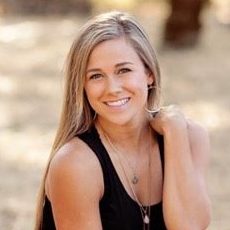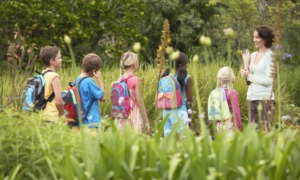
George Rudy/Shutterstock
.
I had the opportunity to work with a young girl named Aria last summer. While she was a little younger than the 16-year-olds I was hosting, this 13-year-old sparked my interest.
The first time I saw her was at our first rally on the first evening of our camp.
She was sitting in the corner, keeping her eyes down, when she looked up at the speaker they were slightly glazed over. I noticed her because she sat near one of our rowdier campers and when I looked to see who was making all the noise, this sweet girl appeared embarrassed by her peer’s outbursts.

Sammie Marie
The next day I was sitting with a group of camp leaders when I noticed her wander past the doors of the cafeteria to the benches by the lake. I excused myself from the table and brought my lunch to go join her.
When I sat down next to her, she shifted away from me, clearly not wanting to talk. I continued to bother her, asking questions and offering food from my plate. She told me she was not hungry but looking back, I’m fairly certain I could hear her stomach screaming at the both of us.
While she didn’t take any of my food, she did get slightly more comfortable and started talking to me. She told me her name, where she was from, how she came across this particular camp and other small details about her life.
Once lunch was over, everyone piled outside in their suits to jump into the lake, and just like that, Aria was gone.
Changing a life
It took me some time but I soon came to find out that Aria had an eating disorder. These were a few of the signs that I picked up on while being a camp leader: someone who is quiet, doesn’t eat with the crowd and never swims with others.
One night, I approached her during a campfire event, pulling her aside to ask her some questions. I began to tell her a story about myself and how when I was younger, I was embarrassed to go swim with my friends because I felt like they would all judge me for not being as skinny as them. I asked her, “Have you ever felt this way?”
She didn’t answer at first but I let the space between us settle and eventually, she whispered one word, “yes.”
I remember sitting there with a simultaneous feeling of heartbreak and joy that this young girl had opened up to me. This was such an important moment in my career as a camp leader and my life as a human being because I had the opportunity to make a change in this girl’s life.
From here, I began spending more and more time with Aria and helping her adjust to her new life at camp with a companion. We would leave the cafeteria and eat together on a log by the lake or take little picnics around the camp and talk until our next obligation as leader/camper came up. We even got to a point where we would jump in the lake when the other campers were away and when she felt comfortable in a bikini where no one else could see her.
This was all so great, but deep down I knew that no matter how comfortable she got with me, that did not mean she was growing in other areas of her life.
How to help
So we started the conversation.
This is when you talk to your friend, family member or, in this case, camper, and dive into the struggles they are dealing with at the present moment.
In her case, since we had not talked about it since the night of the campfire, it was important to slowly open up that wound again.
I started out by giving her affirmations every day, reminding her of her worth. They were anything from, “You know this camp would never be the same without you here,” to “Look at you go — you are already such a strong woman,” and many in between.
Eventually, we began to talk about her insecurities and she opened up. At one point, she asked me what she needed to do to “fix” herself. My reply was simple: “There is no fixing something that does not need to be fixed. If you look hard enough, you can find beauty everywhere you look, all you need to do is open your eyes.” This brought about some tears and I had to hold her for several moments, but after this she started diving into changing her outlook.
It was small at first.
She began by asking other friends from camp to join us for lunch or down by the lake. And when she started being more open with other people, and letting them in on how truly amazing she was, she needed me less and less.
Of course I was still there; especially for the daily affirmation. But she did not need my outlet anymore, as she was finally discovering what it took to trust in herself and love the person she was.
I am to this day still in close contact with Aria and her family, and she has successfully defeated her body image disorder. She is now a camp leader at that very same camp and I am positive she is making changes in other people’s lives as well.
This experience has changed my life. As a camp leader, we are all in the unique position to look out for other girls and boys like Aria and help them develop positive outlooks about themselves, and others.
So I challenge you to take on this exceedingly important role as leader and take action for these kids lives. We must show them compassion, understanding, love and affirm their beliefs that there is hope beyond what they can see, and we are the ones that can show it to them.
Sammie Marie is an occupational therapy student, with the website www.paintingofmylife.com. Her goal is to help people expand their love and joy through health, wellness and meditation.






























